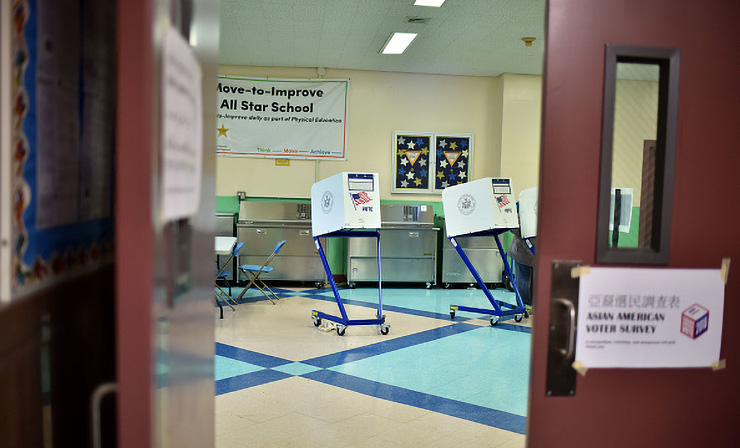
As someone who has experienced two evictions, Fran Taylor has seen firsthand how housing insecurity and her capacity to vote are connected.
“Wealthier people also move but in an orderly, planned fashion that allows them to reregister to vote at their new address,” the San Francisco resident wrote in an email. “They don’t move again and again and again or face periods of couch surfing and homelessness.”
In her home state of California, Taylor has listened to a lot of conversations about race and voter suppression, but not enough about how housing challenges can dampen voter turnout.
“Faced with finding a roof over their heads, poor people would hardly make re-registering correctly a priority,” she said. “I suspect that the number of people who lose their vote because they’ve lost their housing would be significant.”
At the Eviction Lab we share Taylor’s concern. Could being forced to leave your home have an impact on your capacity or your interest to vote? If this was a factor, how big was it? With my colleague Matthew Desmond, principal investigator at the Eviction Lab, we examined if neighborhoods facing evictions were less likely to vote.
To answer this question, we merged two very large data sets: our data on millions of court-ordered evictions from 2013 to 2015 and voter file data1 on millions of registered Americans’ turnout in the 2016 presidential election.
Taylor’s intuition is correct, as we explain in our latest study published in Politics & Society. Eviction plays a powerful role in depressing community voter turnout: fewer people turn out to vote in communities where there has been forced displacement through evictions. This is true even after accounting for factors like poverty that are known to affect eviction and voting.
We explored the relation between evictions and voter participation in many kinds of neighborhoods: in urban and rural communities and in areas with high and low levels of evictions. Evictions negatively impacted voting across communities, but had a stronger effect in some places than others.
For example, eviction plays a stronger role in decreasing voter turnout in states with new voter restrictions and uncompetitive races. On the other hand, the effect of eviction is weak in places allowing registration and voting on the same day or during Election Day2.
Our results demonstrate that eviction has a powerful, negative influence on voting. To double check our results, we used another methodological approach called an “instrumental variables” strategy. We found that the conclusions stand: Eviction depressed voter turnout in the 2016 presidential election.
This study consequently finds: when America votes, housing insecurity matters. Eviction—like poverty, foreclosure, and incarceration—makes it hard for communities to vote. Yet our results also prompt questions about why eviction keeps communities away from the polls.
Research finds eviction causes poverty for individuals and communities. We hypothesized eviction could reduce voting in multiple ways. Renters threatened or displaced by eviction often face job loss and the threat of homelessness. In that scenario, voting becomes less of a priority in order to focus on an immediate and universal basic human need: shelter. These hardships—and their political fallout—might spill over to neighbors if they strain their own resources when lending money, caregiving support, or shelter.
Additionally, eviction increases social isolation. Losing your home increases isolation by moving families farther from family, friend, neighbor, and school networks. When neighbors know and trust each other for years, they can share information and encourage one another to vote. When neighbors lose homes and are forced out of a neighborhood, local community networks suffer.
We ran two additional tests to evaluate how eviction causes lower voter turnout. First, we explored the role of time. Do recent evictions have a greater impact on voting than evictions years ago? We found: the recent eviction rate (2015) had greater influence on voter turnout than the historical, average eviction rate (2013-2015).
Second, we found that the effect of the eviction rate (which measures the rate of renters’ court-based forced moves in a neighborhood) was stronger than that of the eviction filing rate (which measures the rate at which landlords initiate the eviction process in court). This suggests that eviction affects voter turnout primarily through the forced, physical removal of families from their homes—rather than its threat alone.
What this means: Eviction’s influence over voting stems from its immediate and significant consequences: finding shelter, relocating, the complications of (re)registering to vote, and the strain of losing supportive family, friend, and neighborhood networks. At the same time, proactive policy interventions that keep renters in their homes and support voters’ access to the polls could limit eviction’s harmful consequences.
The United States is at a critical juncture: housing has become more and more expensive to the point of being unreachable for many. At the same time, some policymakers are making it harder to vote and participate in our democracy.
By identifying the political consequences of the ongoing eviction crisis, we show that these dual crises are linked. As eviction disproportionately affects low-income, predominantly-Black and Latinx communities, it is likely diminishing the power of low income, Black, and Latinx voters. State and federal policymakers have the capacity to invest in housing and voting policies that promote stability and inclusion. To do otherwise, is antidemocratic.